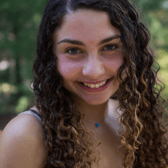My Jewish Feminist Roots and The Fruit of My Mother’s Labor
In third grade I was the new girl at my Reform Jewish day school. I was short, chubby, and had bright rosy cheeks. During my first prayer service I sat quietly and listened to the contemporary and exotic Reform melodies. I had gone to a Conservative school while learning most of the prayers, so when I heard a familiar tune I joined in enthusiastically. Quickly, I realized I was making a fool of myself by singing the wrong words. I had been singing “Modah Ani Lefanaich” while everyone else sang “Modeh Ani Lefanecha.”
“Modeh Ani” is a prayer traditionally said while waking up, to thank god for returning our soul to our bodies. My mother, a Reform Rabbi, had always woken me up singing these words; though she had changed the male oriented, traditional Hebrew words (Lefanecha) to the feminine (Lefanaich), so that the praise was coming from a female, and received by a female God. At the time I was unaware of my thoughtful upbringing, and uncomfortably confused as to why my version of Modeh Ani could not be found in the prayer book.
My mother went to an Orthodox day school where Judaism and feminism did not coexist; in fact, feminism didn’t really exist at all. She was constantly pushing boundaries; as a fourth grader she questioned why two of Jacob’s wives weren’t considered among the Jewish matriarchs. She continued to ask questions and challenge the status quo, and twenty-five years later, already a mother of two, she was ordained a Rabbi. She wanted to give me all the opportunities that she hard fought so hard for; from the get-go, she raised me as a Jewish feminist.
For my Bat-Mitzvah I was given my very own pair of beautiful, brand new t’fillin (a Jewish ritual object traditionally worn only by men). I also bought the perfect, sparkly white dress, and got my hair done exactly like the small magazine cut-out I brought to the salon. My thick, curly hair was put through hours of manipulation. First it was cut, then blow dried, then straightened, and then curled again.
The morning of my Bat Mitzvah came and I was unwilling to put on the half of the t’fillin that were meant to go on my head. They would not only negate the hours of work put into my locks but also ruin my Bat Mitzvah photos and therefore my life. There was no arguing with my 13-year-old logic, especially not ten minutes before the services were said to start.
I ended up leading services with only half of the t’fillin set on, satisfying my femininity while still expressing my religious commitment. Oh, and by the way, the photos are great. Now I’m a slightly more open-minded version of myself, but I still apply t’fillin rosh (the part that goes on one’s head) begrudgingly, not wanting to mess up my hair. There are parts of my mother’s Jewish feminist identity I have adopted and made mine, applying them with praise and love. There are also parts that I have thoughtfully and generally politely rejected.
My mother struggled her whole life to bring her love of Judaism and her expectation of gender equality together. I was raised on the foundation that she had worked tirelessly to build. In my first week of third grade and ten minutes before my Bat-Mitzvah, though, I was not particularly thankful for this foundation, but it’s something I’ve grown to appreciate and love.
I grew up with a Jewish feminist path not only as an option, but as the only thing I knew. When I was sitting in that service in third grade, feeling embarrassed that I was singing the “wrong” words, I had no idea it was because my mother was raising me as a Jewish feminist. And when I pushed back against my mother, insisting that t’fillin had to work with my sense of beauty, I did not know that I was creating my own Jewish feminist identity. Now I know that this is such a blessing in my life; I was given a deep spiritual connection that wasn’t compromised by oppression, and I have embraced this identity. My mother struggled her whole life so that I could have this identity, and now I want to work to sustain it for future generations.
This piece was written as part of JWA’s Rising Voices Fellowship.







